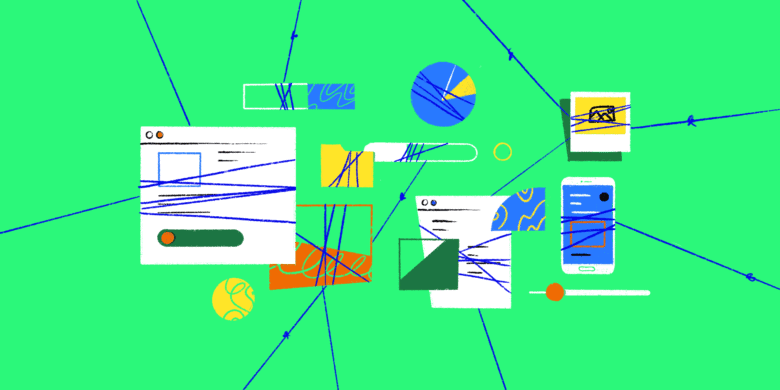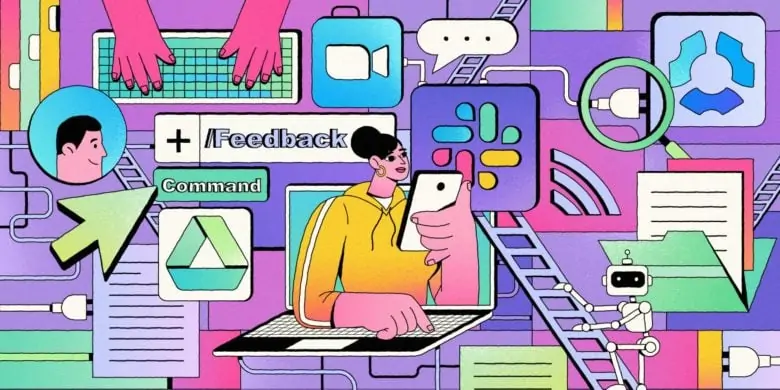Less is definitely more — at least when it comes to the tools used in project management for agencies. Yet if you ask project managers which tools they use, you’ll get a seemingly endless list.
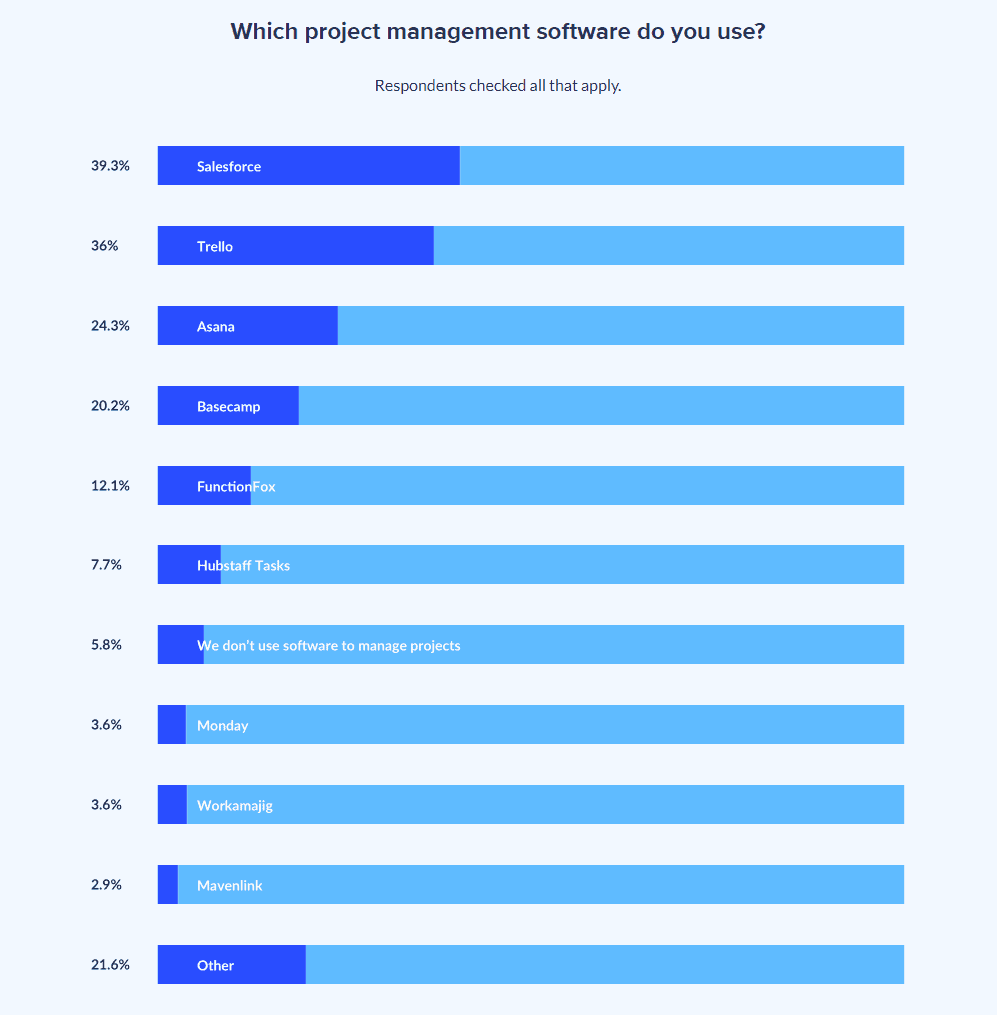
Unsurprisingly, having a bloated toolkit is hugely inefficient.
It requires you to constantly switch between platforms and capabilities, learn a ton of different conventions and rules, and go through endless onboarding programs.
The solution?
Pick just one or two powerful project management tools that’ll do everything your agency needs.
To help you find the silver bullet, we’ve rounded up the 10 best options.
Looking for project management software for your agency? Check out these 10 options. Click To TweetBoost your team’s efficiency with Hubstaff's productivity tools
Try it free for 14 days1. Hubstaff Tasks

When it comes to managing agencies, time tracking and project management go hand-in-hand. That’s what makes Hubstaff Tasks a great agile project management software. The platform that’s built with simplicity in mind uses Agile methods to move projects forward, with visual workflows and kanban-style boards.
Assign tasks, create checklists, add deadlines — it’s all built-in so everything you need to know about a project (status, budget, workloads) is in one place.
Use the sprints feature to determine priorities for your team and manage workloads. With project boards, you can easily see where a task is at without having to interrupt your team to check in.
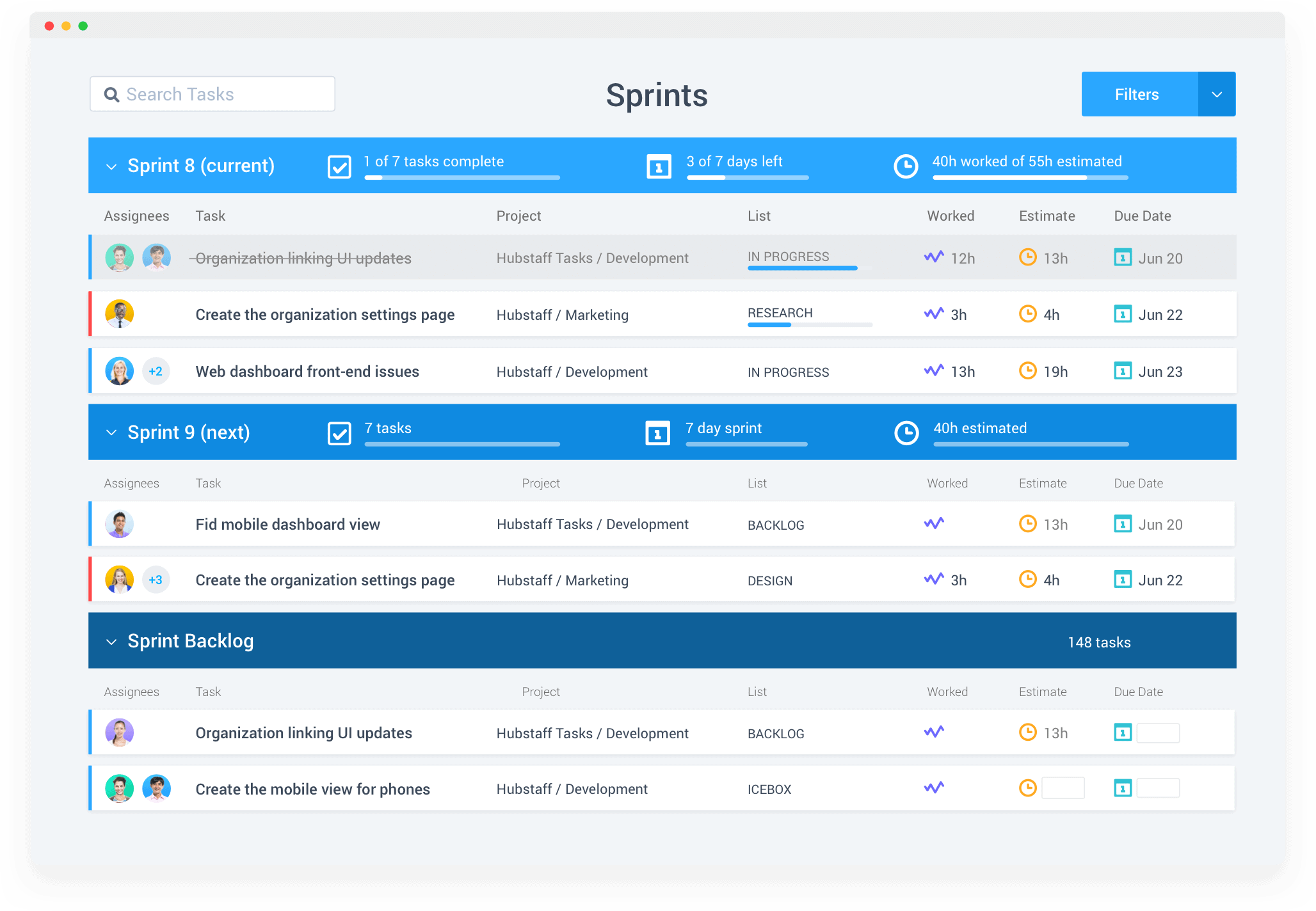
When you first sign up, you can choose from an existing template based on how you plan to use the platform. Here are a few you can choose:
- Blog management
- Content amplification
- Google and Facebook advertising
- Project management
- Customer case studies
- Video marketing
- And more
As you’re setting up your projects and team, you can automate your workflows. Choose how a task will move through your process, and automatically assign it to the next person with one click.
Each task has all of the relevant information included, so handing off work in an agency is quick and seamless. There’s no question about what needs to be worked on and when.
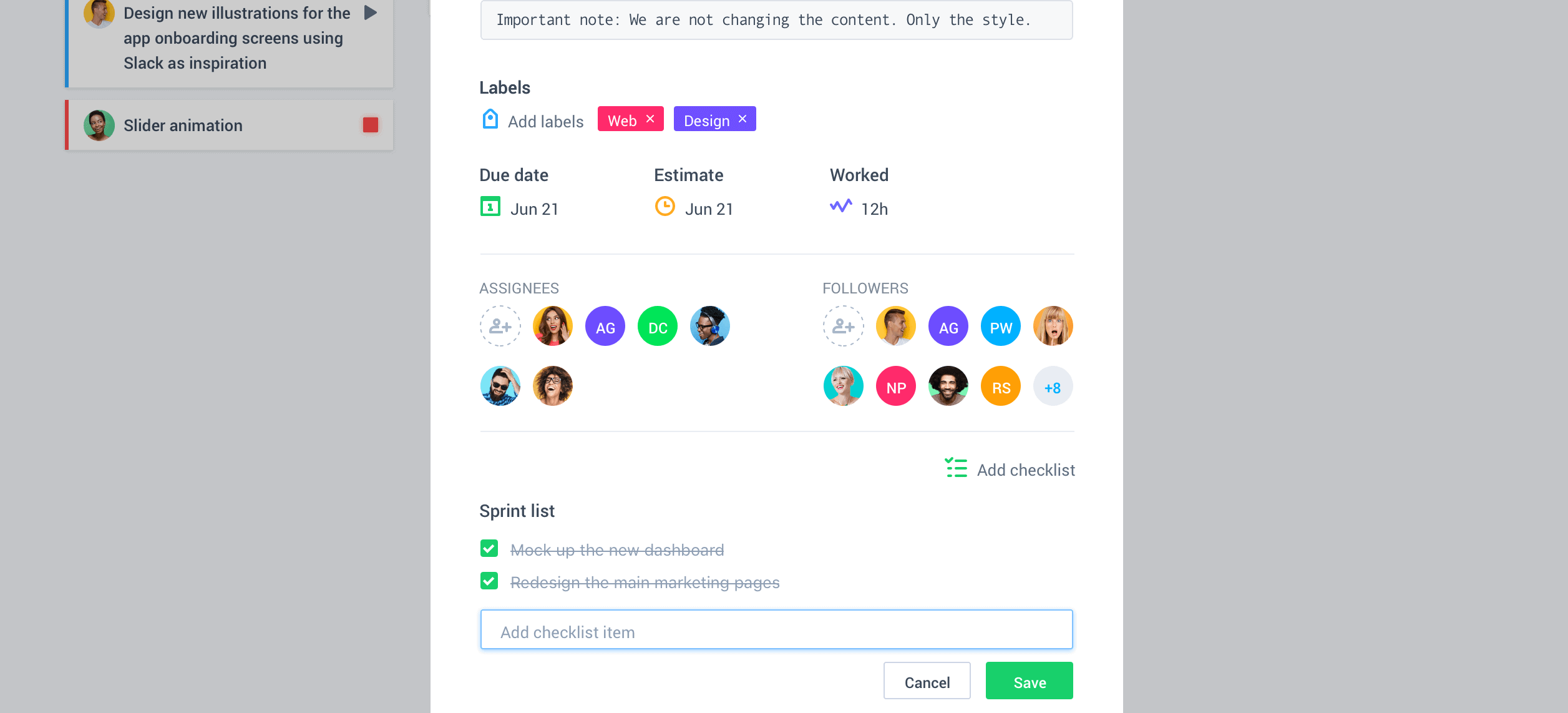
The app was designed with Agile methods and intentional simplicity in mind so that your team can be nimble yet productive as they work on client projects.
Try it free for 14 days. After that, it’s only $5/user per month — and completely free for up to five team members.
You can use Hubstaff Tasks with Hubstaff time tracking to streamline agency management, accurately and automatically recording time worked so teams don’t need to fill out error-prone paper timesheets.
Manage agency projects with ease
Assign tasks, manage projects, and balance workloads with Hubstaff Tasks.

2. Mavenlink
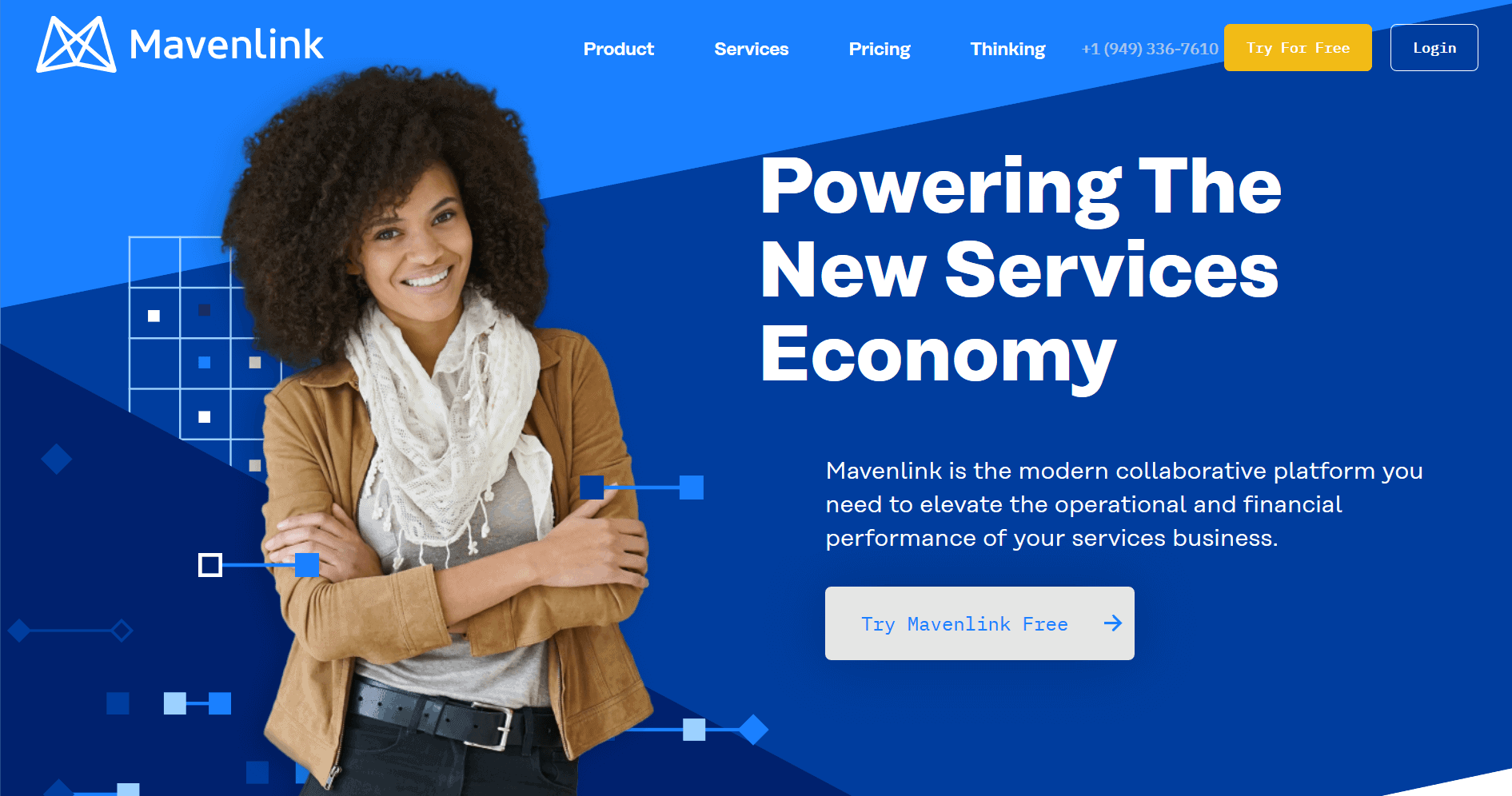
Mavenlink makes use of primarily visual aids like Gantt charts and bar charts, making it one of the ideal agency management systems for teams of visual thinkers. These charts are representations of your team’s progress, dependencies, and priorities.
Mavenlink has two unique features worth mentioning.
First, you can create project templates, which break down projects by core tasks and time expectations. (e.g., “Client brainstorming session, 2 hours”). If your agency frequently takes on projects of similar types, having templates will save you lots of time.
Second, because projects often have unexpected delays, Mavenlink lets you make cascading changes to your deadlines. If you move back one task’s deadline, every related deadline will move back accordingly.
The downside to Mavenlink is its pricing: it starts at $15/month per user for just the most basic features. If your business is on the larger side, you might be able to find other tools with features that you need more at less expensive prices.
3. Workamajig
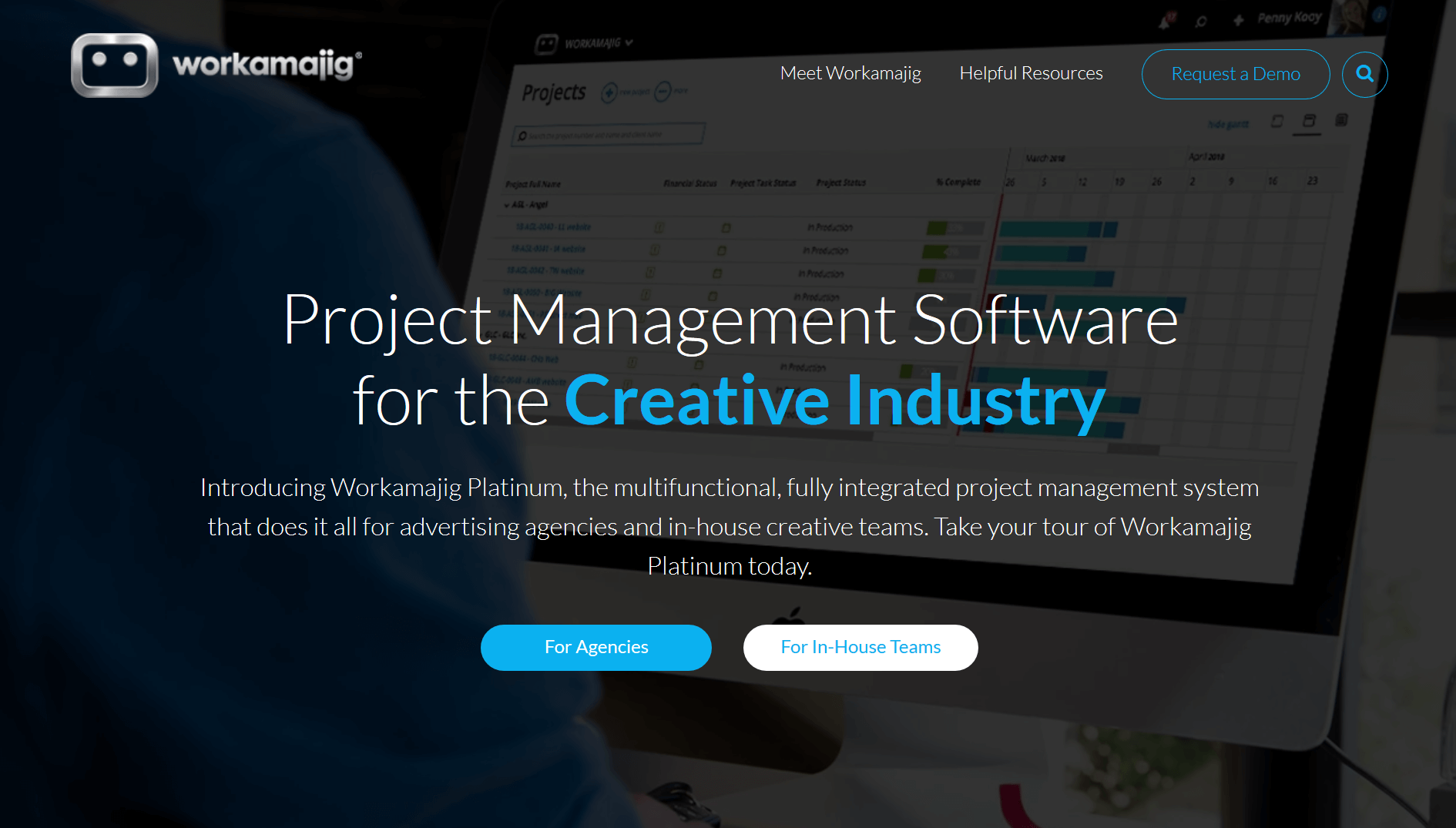
Designed specifically for digital agency management, Workamajig offers a full suite of tools to take you from the RFP stage to paid.
Workamajig is a comprehensive agency project management software platform with features that fall into several buckets: accounting, collaboration, CRM, project management, digital proofing, and media management systems.
Having such a comprehensive system is great, but be aware that Workamajig suggests allocating two to three months (and multiple training sessions) to implementation. If you need a fast and easy solution, there may be other better alternatives to Workamajig.
4. AgencyHub
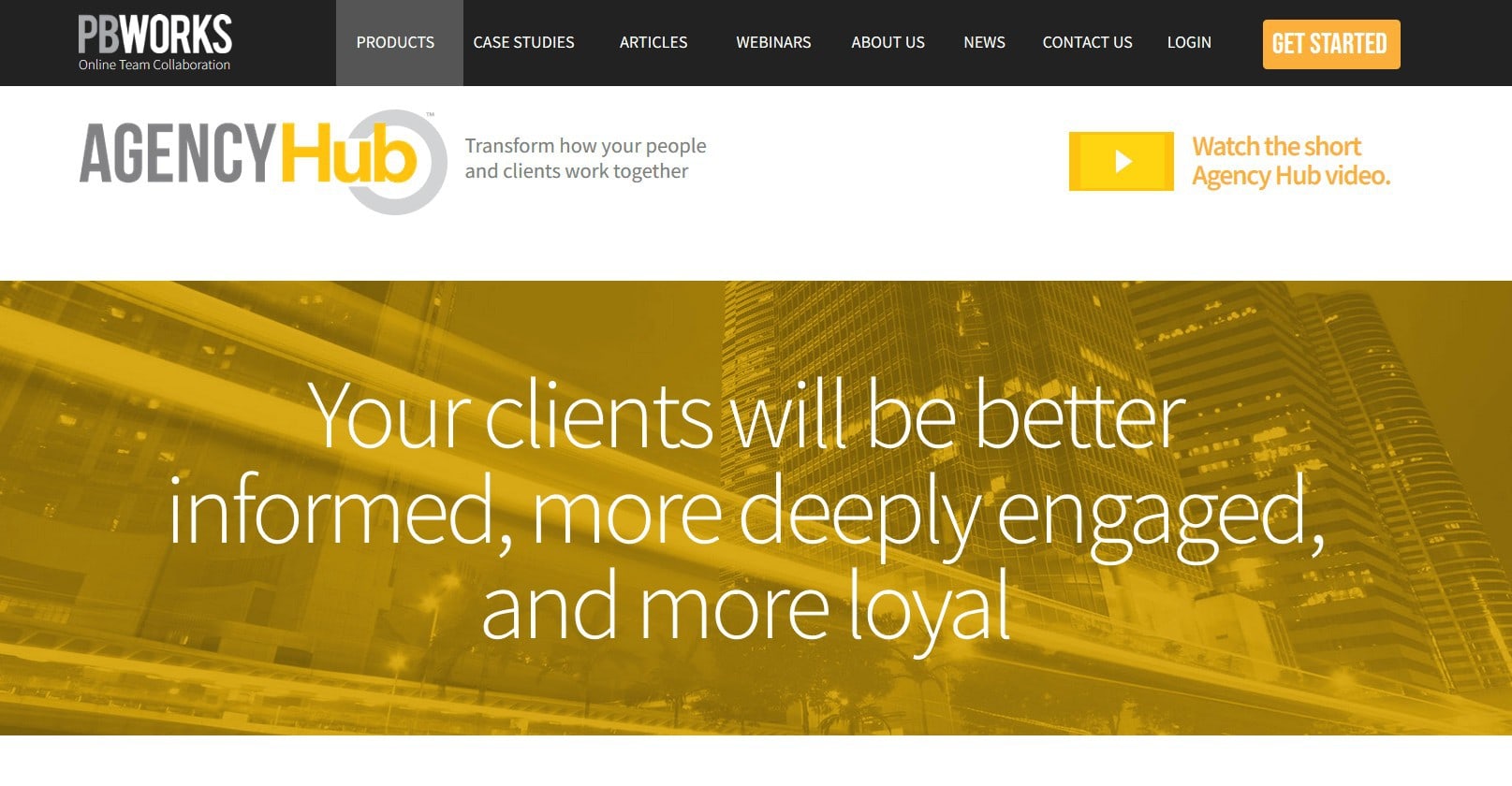
AgencyHub is a good choice if you’re looking for an agency management tool for small-sized teams.
Reason 1: It’s free.
Reason 2: It’s a low-risk way to experiment with project management software before your agency gets bigger and you need to invest in something more powerful.
AgencyHub gives you the ability to see a single-page, visual summary of each project. You can also store, distribute, and collaborate on documents, media, and other files.
Automated notifications will keep everyone stay up-to-date, and task lists tracking who’s assigned to which content will maintain accountability.
Subscribe to the Hubstaff blog for more project management tips
5. ProofHub
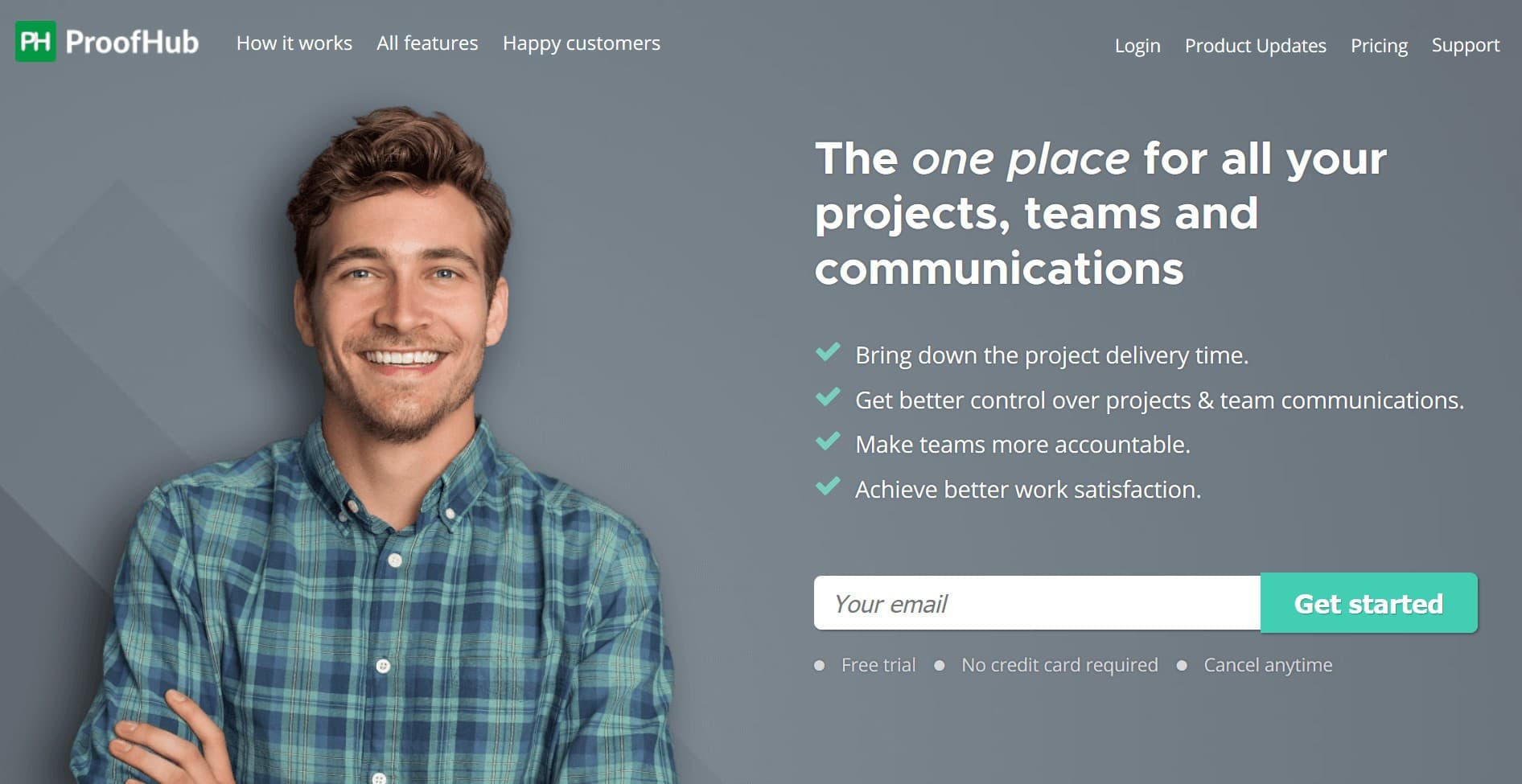
ProofHub is a powerful project management software that helps you stay on top of your projects.
Its main features include task management, online proofing, notes, Gantt charts and, reports. It also integrates third-party applications such as Google Drive, OneDrive, Dropbox, and Box.
ProofHub’s task management capabilities allow you to keep track of your team’s progress. It helps you stay in control of projects, collaborate with your team more easily, and accomplish tasks with better efficiency. And, there’s a mobile app so you remain connected with work even when you’re on the run.
6. SpiraPlan
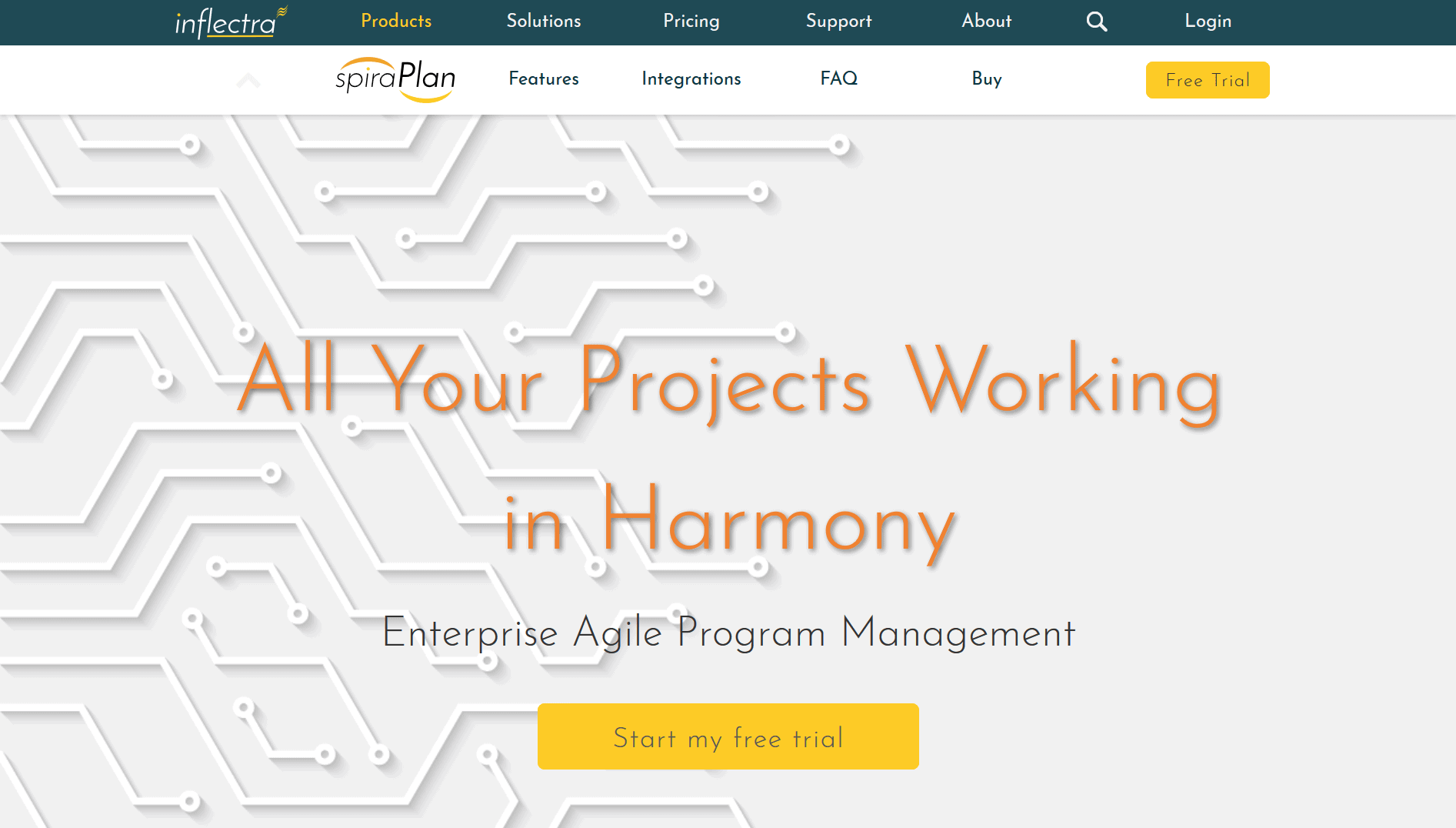
SpiraPlan is an agency management tool that is clearly tailored toward agile development teams. Each ongoing project receives its own comprehensive dashboard, which allows you to quickly see its health. Along with helpful graphs, you’ll see summaries of the top open issues, the total number of open incidents, and more.
SpiraPlan has a resource allocation feature that gives you the power to balance your team’s workload.
For example, if you see that John Doe has 20 hours left this week, you can give him 10 hours to work on a specific task and 10 hours to work on incidents. SpiraPlan also offers a time-card entry system so developers can enter the time they spent each day on tasks and incidents.
Lastly, the software provides instant messaging and chat, agile reports, and code repositories and build server management.
7. Planscope
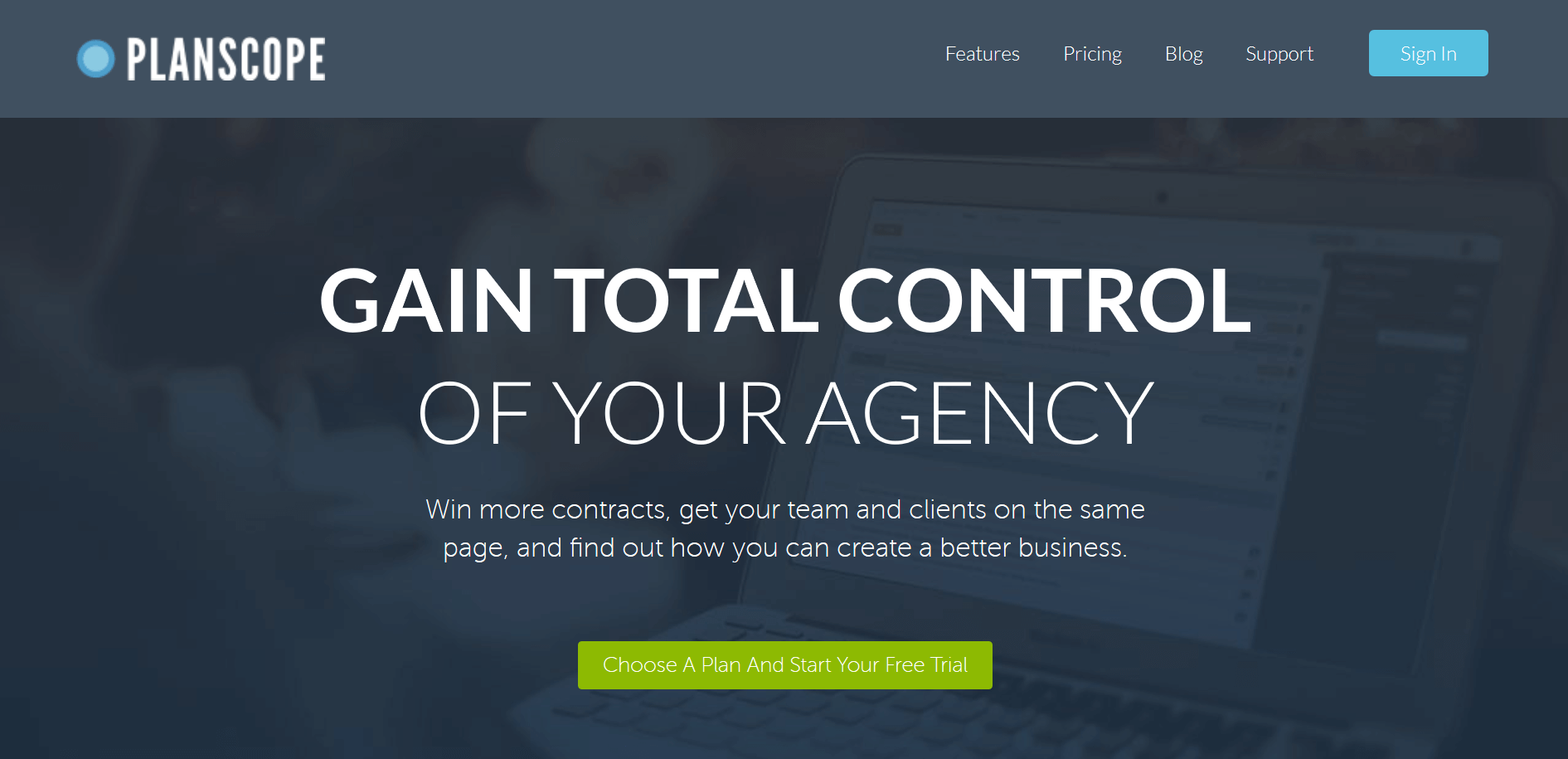
Planscope aims to simplify project management in your agency, and thus has many differentiating features. For example, instead of sending your client an overview of the project scope and price tag, you can use the Collaborative Estimates feature to agree on a scope and prioritization that fits their budget—and incorporates your rates.
Once you’ve secured a client, Planscope helps you bill by the hour or the month, the task or feature, or the entire project. You can choose to share as much (or as little) of this info as you want with your clients, team members, and contractors.
In addition, Planscope offers one-click time tracking, email integration, automatic daily recaps for your client, and detailed analytics.
Do note that because Planscope was originally designed for freelancers, it lacks many of the accountability features that other project management tools come with.
8. Brightpod
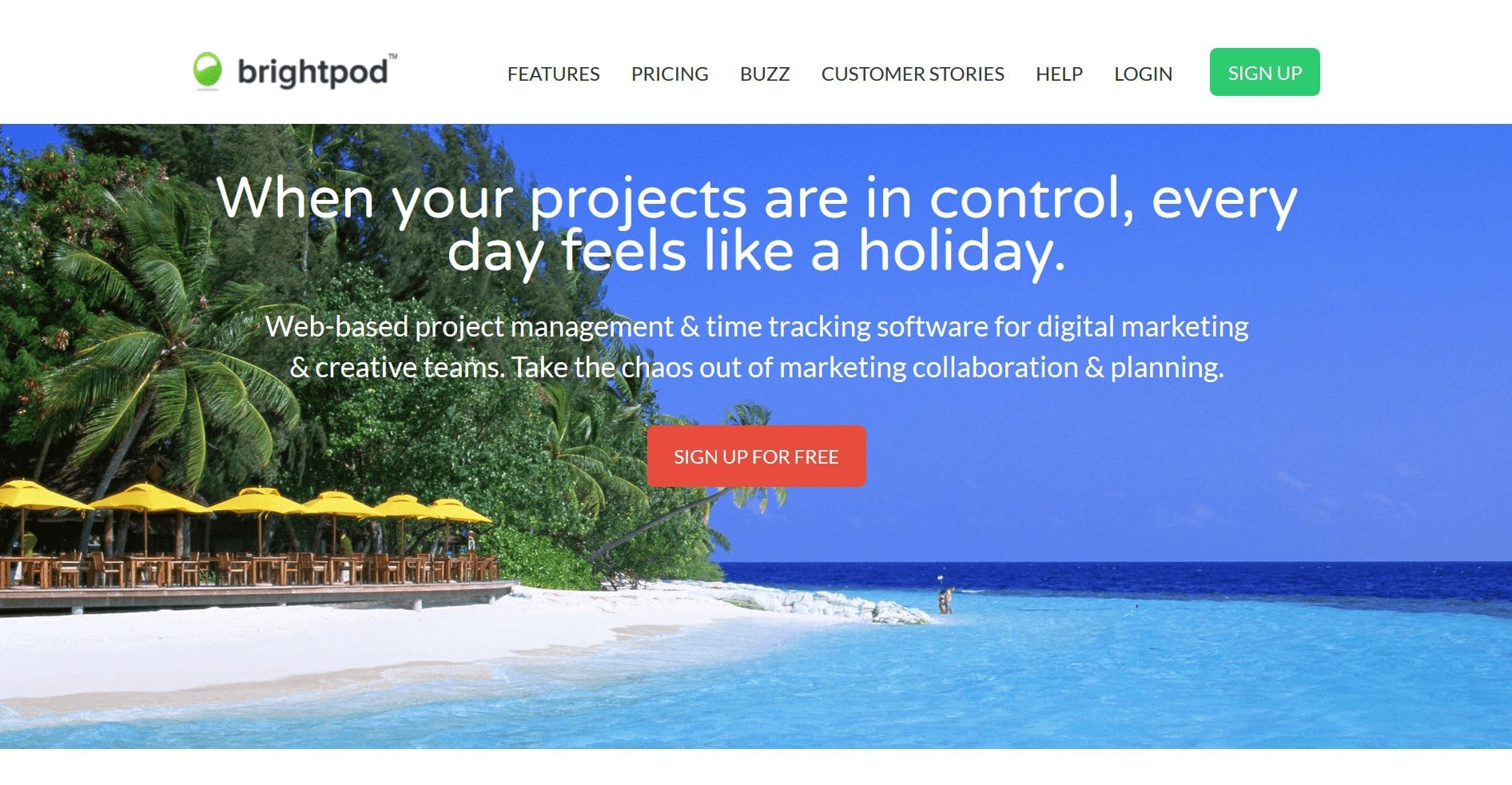
Brightpod aims to make project management for marketing agencies and creative teams easier.
It gives you a unified system for all your campaigns, content, and website projects. You can label each of them with color tags and visual progress bars so you can get a quick overview of how things are going.
Brightpod has a kanban board system that will feel familiar if you have used Trello before. The platform also allows you to set “workflows,” or templates for your frequent social media and marketing tasks.
Finally, Brightpod offers limited time tracking functionality. You can make time budgets for projects, track time or add custom time entries, and export the data to a spreadsheet.
9. RoboHead
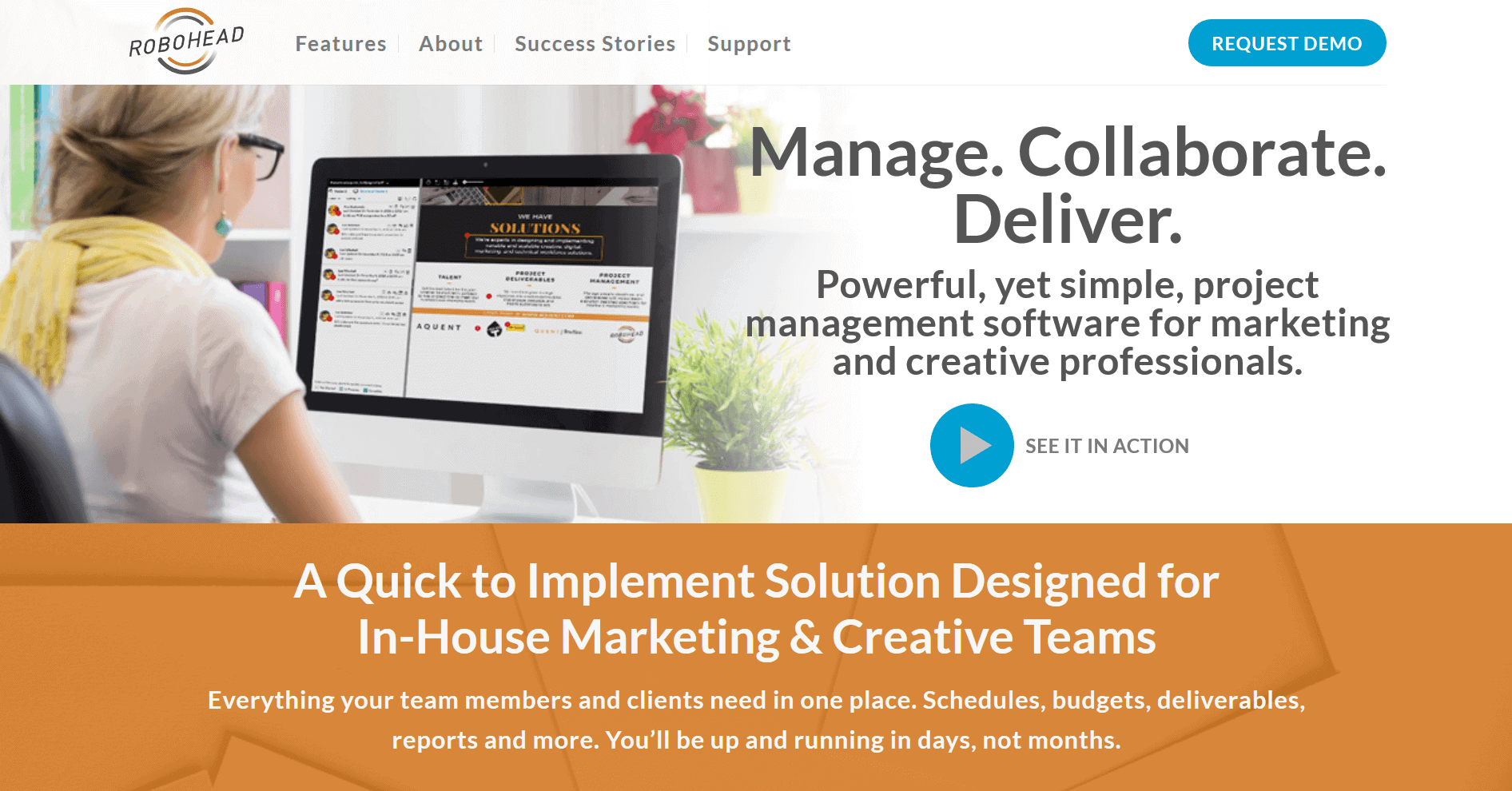
RoboHead is a web-based project management tool for digital marketing agencies, freelancers, and large enterprises alike.
Like most project management platforms, RoboHead has a central dashboard where you can view ongoing projects, recent activity, and real-time reports. Each project has its own summary, along with specific tabs for tasks, expenses, files, notes, etc.
RoboHead also has some unique services. With the customizable Project Request form, you can also create creative briefs for potential clients. And in addition to uploading and storing media, RoboHead enables annotation, markup, versioning, and approval.
RoboHead is a good choice for bigger teams, but its large number of features may make it unwieldy for small agencies.
10. Scoro
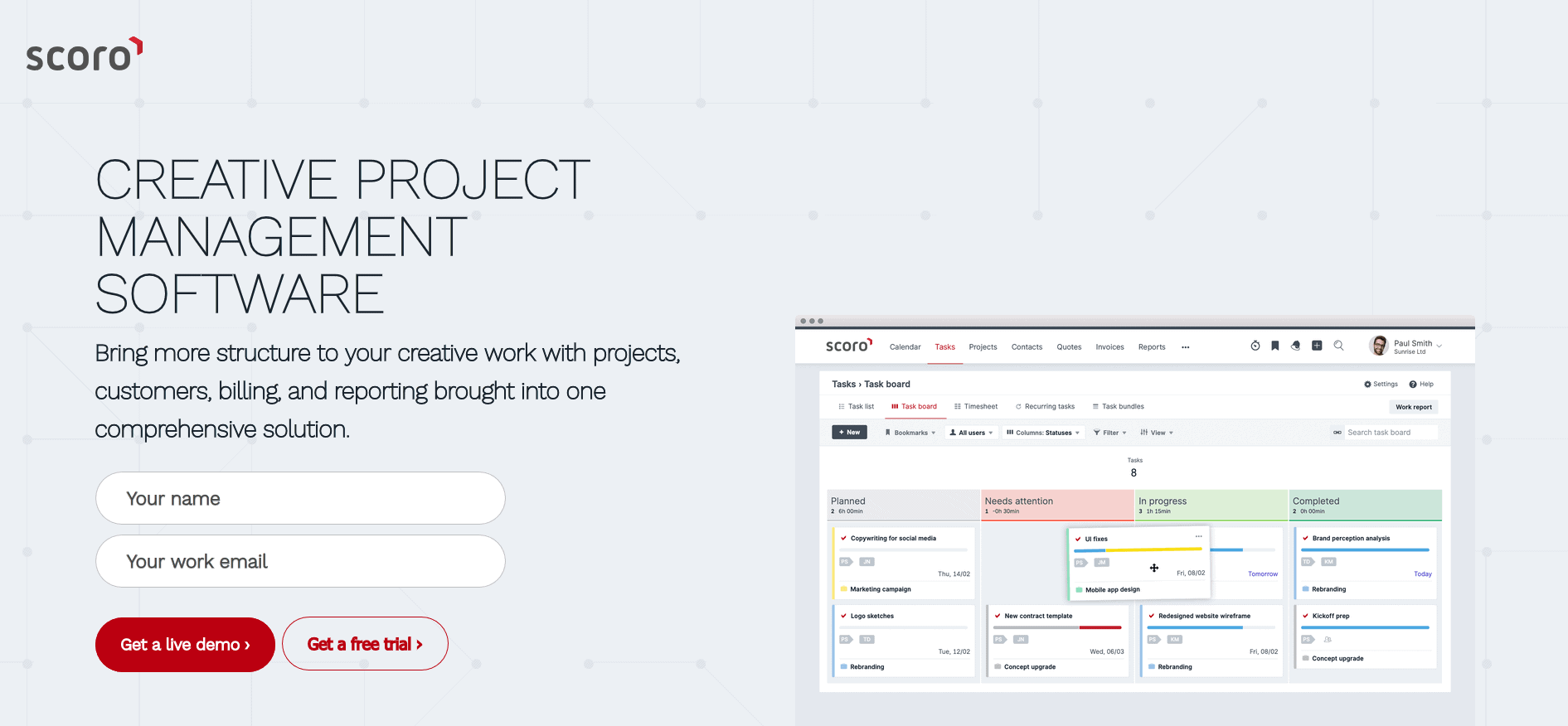
Scoro is a marketing agency management solution for small and medium businesses. The interface is clean and minimal so you can focus more on work.
However, the features it comes with are fairly basic as well.
You can align your team’s schedules and tasks, manage billing and expenses, track late client payments, and more.
Scoro also functions like a CRM, giving you a 360 view of your accounts, linking tasks and events to specific contacts, tracking opportunities and deals, and managing quotes and orders.
You can integrate Scoro with many tools you may already use, like MailChimp, Dropbox, and QuickBooks.
How do you choose?
Having the right project management software can make the difference between finishing a project on-time and within your budget, and totally missing the deadline while spending way too much.
Choosing an agency management software for your business should be a very serious decision. If you’re stuck between several choices, write down your agency’s three biggest organizational challenges. You can use this as a reference for identifying which platform has the features your business needs most.
Why agencies need creativity in project management
Many modern agencies run on creativity to get the edge over competitors and come up with great ideas that will deliver enormous value to their customers.
But encouraging and streamlining creative processes is tricky; leaving them to run on their own is even more dangerous. Think missed deadlines, blown budgets — all of the worst outcomes.
Managing a group of people expected to come up with the next most brilliant idea in the whole world can be quite a ride.
It’s definitely not the same as organizing the work of a software development team, or, for that matter, of an accountancy firm.
But, the good news is, you’re not the only one facing this conundrum.
Many agencies have tried the same path before you and can share their knowledge. Here are some tips to ace project management for your creative agency.
#1. Understand the prerequisites for creative work
Coming up with innovative and attractive ideas rarely happens on a production line.
Creativity requires time, space, and, most importantly, mind space in a person’s head. Respect the needs of your team members and give them the flexibility they require. It’ll pay off.

#2. Don’t let bad clients ruin creative inspiration
While outstanding problems with your team’s work needs to be addressed, not every client’s whim has to reach your team’s ears. Your project manager can gather feedback and share it with the team in a discussion or conversation where concerns can be brought up and remedied.
The most demotivating thing for a creative person is to realize the people you create for don’t appreciate your efforts.
#3. Create clear processes to avoid confusion and delays…
This is simple — when you create a working framework, people can focus on creative work rather than organizational issues.
Your team needs to know what they have to do, how they are expected to do it, and when they need to get it done. To make their lives easier, a project management schema has to provide them with step-by-step processes for achieving their tasks.
Using one of the top tools listed above is a good place to start.
#4. …But don’t get caught in following a process for its own sake
Successful project management in any team, of any size, requires flexibility and the expectation of change.
Even if you have perfect processes, different projects and groups of team members may need novel approaches. Keep your mind open and don’t turn into a process police.
Instead, use your power to steer the team toward the most appropriate path for the current circumstances.

#5. Never forget you’re dealing with people who have emotions
You need a ton of empathy to be a good project manager in any field, but in the creative industry, understanding emotions is crucial.
The creative process can be excruciating for the creator. It can reveal the creator’s insecurities, since they only want their work to be appreciated. That’s why you need your best mix of compassion and inspiration to handle problematic situations.
Get better at creative project management
Learning the intricacies of managing creative teams takes time. How do you know you’re there?
If your team members come to you with stunning new ideas, you’re probably doing something right.
But since most of us are still getting there, make sure to check out the basic tips we’ve just reviewed – and don’t be shy to use software that makes your job easier.
What’s your favorite agency software?
Did we miss any awesome platforms that should be on this list? Let us know in the comments below. If you have used any of the tools we covered above, we’d also love to hear your experience with it.
This post was originally published April 2017, and updated May 2019.
Most popular
How to Calculate a Raise: Practical Guide for Employers
By 2030, the US alone will lose $430 billion annually due to low talent retention — and a lot of this turnover stems from low pa...
How to Survive and Thrive in an 80-Hour Work Week
It’s hard to believe that only a century ago, the 80-hour work week was the norm in the United States. Then, in 1926, the Ford M...
Mastering Workforce Scheduling: Techniques and Tools for Success
Imagine a workday where scheduling your workforce effectively ensures that every shift is perfectly aligned with your business nee...
Top Time Trackers for Virtual Assistants: Enhance Efficiency and Accountability
Virtual assistants (VAs) have a lot of responsibilities — and so do the people who hire them. With so much to keep track of, a t...


